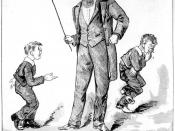The Effects of Corporal Punishment by Brenlee Robinson Corporal punishment is a punitive act that inflicts pain. This includes hitting, slapping, spanking, or forcing a child to maintain an uncomfortable position. American data suggests that 93% to 97% of children have been spanked. The use of corporal punishment declines as children reach adolescence, to a reported 52%.
Frequently a punishment has more to do with a parent's frustration level than with the child's misbehaviour. Many cases of child abuse result from an escalation of "low level" hitting or spanking.
The CWLC and other organizations have policies opposing the use of corporal punishment. Many child advocates are against corporal punishment because of the affront to the child's dignity. Others oppose it because of the unfairness of an adult using physical force on a much smaller child. For others still, the issue is one of justice. If we are legally prohibited from striking other adults, why is it okay to strike a child? Research indicates there are more reasons to oppose the use of corporal punishment and to support alternative disciplinary methods.
Does Spanking Work? Studies indicate that physical punishment does temporarily produce the desired results. But in the long term, spanking not only does not work, it carries with it numerous negative effects.
The long-term use of corporal punishment tends to increase the probability of deviant and antisocial behaviours, such as aggression, adolescent delinquency and violent acts inside and outside the family as an adult. One explanation is after living with violence that is considered legitimate, people expand this to accept violence that is not considered legitimate.
For example, violent acts that are considered legitimate include maintaining order in schools by punishing children, deterring criminals and defending one's country against foreign enemies. The Cultural Spillover Theory proposes that the more a...


